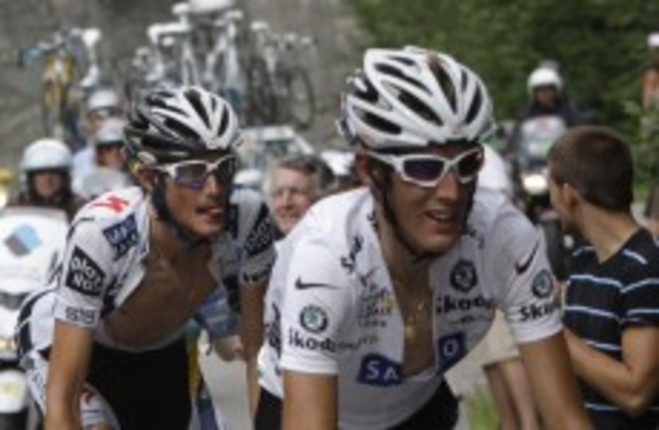THE FUTURE OF Alberto Contador is still unclear, having tested positive for clenbuterol, a banned weight loss drug, during the 2010 Tour de France, he is yet to be officially sanctioned.
A decision by the Spanish Cycling Federation is expected some time between next week and the middle of February.
If the decision goes against Contador, he will not be allowed to participate in the 2011 Tour de France. As a result, there will be one outstanding favourite to take the maillot jaune this July, the runner-up for the past two years: Andy Schleck.
The younger Schleck has proven over the last 24 months that he is a stronger climber and more accomplished time-trialist than his team-mate and elder brother Frank.
Despite this, the siblings from Luxembourg often refer to themselves collectively, making statements like ‘our aim is to win the Tour de France’. Cycling is of course a team sport, but only one rider can wear the yellow jersey into Paris at the end of the Tour.
So while Frank will no doubt be a valuable asset to Andy in the high mountains of the Alps and the Pyrenées, he should be suppressing any personal Tour ambitions he may have, as he has shown throughout the last five years that he is not good enough to win the biggest bike race in the world.
The closest Frank has come to winning the Tour de France was in 2008. He was wearing the race leader’s jersey when his Team CSC Saxo Bank team mate Carlos Sastre attacked on the slopes of Alpe d’Huez on Stage 17. Sastre gained enough time over all his rivals in that one attack to win the Tour de France.
At the time, the Schlecks, Sastre and team manager Bjarne Riis all agreed that Sastre’s attack had been planned. Essentially, Frank Schleck had decided to sacrifice his own Tour chances for the good of the team.
However, in a recent interview on cyclingnews.com, both Schlecks admitted that Sastre’s attack had come as ‘a bit of a surprise‘ to them.
Their plan was for Frank to attack on the Alpe in an attempt to gain time over the biggest threat on GC, Cadel Evans. However if Frank Schleck had attacked before Sastre and managed to take the same amount of time out of Evans as Sastre did, Team CSC Saxo Bank would have lost the Tour, and Evans would have ultimately been crowned Tour champion.
To illustrate, Sastre lost 36 seconds to Evans in the final time trial, Frank Schleck lost 3’33″, considerably more than the 2’15″ advantage Sastre gained on Evans up the climb of Alpe d’Huez. Consequently, Schleck dropped from second overall to fifth. It seems Schleck’s lack of ability in the time trial made winning the 2008 Tour de France an impossibility regardless of how his team’s attacks on Alpe d’Huez were orchestrated.
Rivals
In the same interview on cyclingnews.com, the Schleck brothers single out reigning Giro d’Italia champion Ivan Basso as their main rival for this year’s Tour. But they warn that ‘[Basso] has to improve if he is to win the Tour…there’s a difference between winning the Giro and winning the Tour de France‘. That’s a separate debate altogether, but Basso would certainly be in a much better position than Frank Schleck to have an informed opinion.
Basso has won the Giro d’Italia twice (2006,2010) and finished on the podium of the Tour de France twice (2004,2005). Whereas Schleck has never finished on the podium of a Grand Tour. His best results have been two fifth-place finishes in the Tour (2008,2009) and a fifth place in last year’s Vuelta a Espana. He has only once ridden the Giro, in 2005, when he finished 42nd overall.
There is only one individual time trial on the route of the 2011 Tour de France, but at 41 kilometres in length it could still cause Frank Schleck to lose minutes to more capable time trialists.
If Frank somehow finds himself in the yellow jersey towards the end of the Tour, it is unlikely that he will be able to defend a lead in the final time trial, unlike Andy, who is a capable enough time trialist to defend the jersey (depending on the size of his lead). But the brothers seem unwavering in their double act, rather bizarrely going as far as to say they would like to retire from cycling at the same time, despite a five-year age difference.
They have also previously stated an ambition to both stand on the Tour podium in Paris (ie both finish in the top three). This requires both of them to remain in the front group on all the tough mountain stages, whereas it would make more tactical sense if one was to completely sacrifice themselves for the other.
In Contador’s absence, Andy Schleck may never have a better chance of winning the Tour de France. Frank will be 31 come July and finally needs to realise that any Tour victory for his family can only be achieved through his younger brother and not through himself.

